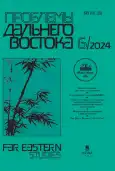Patriotic Education of Military Personnel in the Republic of Korea as an Instrument for Ensuring State Security (1950–1980)
- Autores: Grinev I.V1
-
Afiliações:
- M.V. Lomonosov Moscow State Univer- sity
- Edição: Nº 6 (2024)
- Páginas: 136-149
- Seção: Military build-up
- URL: https://journal-vniispk.ru/0131-2812/article/view/280018
- DOI: https://doi.org/10.31857/S0131281224060096
- ID: 280018
Resumo
Palavras-chave
Sobre autores
I. Grinev
M.V. Lomonosov Moscow State Univer- sity
Email: nagy9881@gmail.com
ORCID ID: 0009–0000–6475–6251
Graduate student, Institute of Asian and African Studies Moscow, 125009, Russian Federation
Bibliografia
- Choe Dok Sin. My thirty years in South Korea. Pyongyang: Foreign Languages Publishing House, 1989. 268 р.
- Current intelligence bulletin. Office of current intelligence. June 7, 1956 // Central Intelligence Agency Freedom of Information Act Electronic Reading Room. URL: https://www.cia.gov/readingroom/document/03015156 (дата обращения: 27.10.2024).
- Eun Seo Jo. Fighting for Peanuts. Reimagining South Korean Soldiers' Participation in the Wollam Boom // Journal of American-East Asian Relations. 2014. Vol. 21. No. 1. Pp. 58–87.
- Joo Hyo Sung. South Korean Men and the Military: The Influence of Conscription on the Political Behavior of South Korean Males. CMC Senior Theses. Paper 1048 // The Claremont Colleges Library. 2015. URL: https://scholarship.claremont.edu/cmc_theses/1048 (дата обращения: 27.10.2024).
- Kim Choong Nam. The Impact of the Korean War on the Korean Military // International Journal of Korean Studies. 2001. Vol.5. No. 1. Pp. 159–182.
- Ko Gi Wuon. Military education system and national development: The case of the Republic of Korea Army. Monterey: Naval Postgraduate School, 1983.
- National Intelligence Estimate. The Korean Military Balance and Prospects for Hostilities on the Peninsula. 1987 // Central Intelligence Agency Freedom of Information Act Electronic Reading Room. URL: https://www.cia.gov/readingroom/document/0005569324 (дата обращения: 27.10.2024).
- National intelligence survey. South Korea. 1973 // Central Intelligence agency Freedom of Information Act Electronic Reading Room. URL: https://www.cia.gov/readingroom/docs/CIA-RDP01–00707R000200080004–3.pdf (дата обращения: 11.12.2024).
- Park Chung Hee. Major Speeches by Korea's Park Chung Hee. Seoul: Hollym Corp., 1970. 390 p.
- Park Chung Hee. Saemaul: Korea's new community movement. Seoul: Korea Textbook Co., 1979. 288 p.
- Won Moo Hurh. “I Will Shoot Them from My Loving Heart”: Memoir of a South Korean Officer in the Korean War. Jefferson: McFarland & Company, Inc., Publishers, 2011. 196 p.
- Yang Sun Gik. The South Korean Military Ideological Complex: Transcendent Nationalism in Military Moral Education // Journal of Korean Studies. 2024. Vol. 29. No. 1. Pp. 61–88.
- Правила отбора и приема в Школу информационно-психологических войск Вооруженных сил // Korean Law Information Center. URL: https://www.law.go.kr/LSW/lsInfoP.do?lsiSeq=24710#0000 (дата обращения: 02.05.2022).
- Белая книга обороны. 1967. 서울: 대한민국 국방부, 1967. 263 명.
- Белая книга обороны. 1988. 서울: 대한민국 국방부, 1988. 360 명.
- Белая книга обороны. 2000. 서울: 대한민국 국방부, 2000. 308 명.
- Приказ о школе информационно-психологической подготовки сухопутных войск // Korean Law Information Center. URL: https://www.law.go.kr/LSW/lsInfoP.do?lsiSeq=24710#0000 (дата обращения: 27.10.2024).
- За что мы сражаемся?. 서울: 대한민국 국방부, 1952. 95 명.









